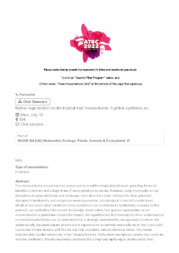Native regeneration under tropical tree monocultures: a global synthesis.
Native regeneration under tropical tree monocultures: a global synthesis.
Author(s): SIMÕES, L. H. P; GUILLEMOT, J.; RONQUIM, C. C.; WEIDLICH.; BRANCALION, P.
Summary: ABSTRACT: Tree monocultures are widespread across human-modified tropical landscapes, providing financial benefits to farmers and a large share of wood products to society. However, using monoculture tree plantations to promote forest and landscape restoration have been criticized for their potential damages to biodiversity and ecosystem services provision, accordingly it is crucial to understand whether and under what conditions these plantations can contribute to biodiversity recovery. In this research, we synthetized the current knowledge about native tree species regeneration under monoculture tree plantations across the tropics. We hypothesized that tree regeneration under tropical monoculture plantations can be substantial but is strongly modulated by management practices. We systematically reviewed papers about natural regeneration under tree monocultures in the tropics and conducted a meta-analysis with the studies that included a natural reference forest. This review included sixty studies carried out in four tropical biomes, thirty-seven ecoregions, twenty-two countries and five continents. We also explored a database that comprised eighty-eight studies about tree species regeneration under Pinus sp. and Eucalyptus sp. monocultures in Brazil as a case study to investigate the potential accumulation of woody species in tree monoculture understories. The woody species richness of plantations? understory showed high variability, suggesting the role of management in the regeneration potential. Monoculture tree plantations presented on average 39% of the richness and 24% of the tree abundance of the reference forests. Longer rotation, native species monocultures, and plantations adjacent to forest remnants harbored more species. In the case study, we found eight-hundred species regenerating in approximately twenty-five hectares. Our results suggest that monoculture plantations are not always ?green deserts? and can actually harbor diverse woody species regeneration. Management practices play a crucial role in determining their conservation value. Furthermore, diversity and abundance of woody regeneration under tree monocultures are not comparable with reference areas, emphasizing that protecting forest remnants is imperative for biodiversity conservation.
Publication year: 2022
Types of publication: Abstract in annals or event proceedings
Unit: Embrapa Territorial
Observation
Some of Embrapa's publications are published as ePub files. To read them, use or download one of the following free software options to your computer or mobile device. Android: Google Play Books; IOS: iBooks; Windows and Linux: Calibre.
Access other publications
Access the Agricultural Research Database (BDPA) to consult Embrapa's full library collection and records.
Visit Embrapa Bookstore to purchase books and other publications sold by Embrapa.

